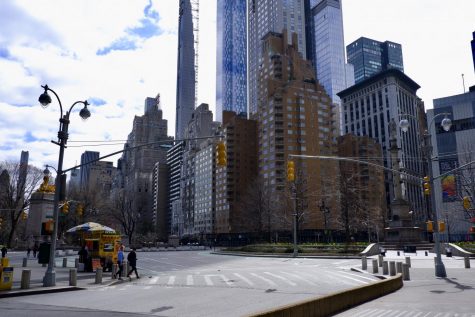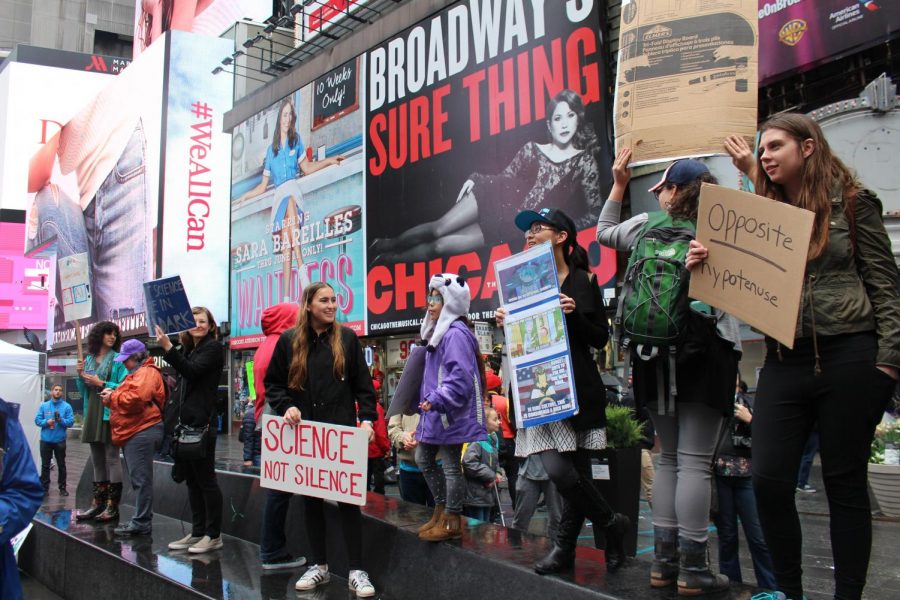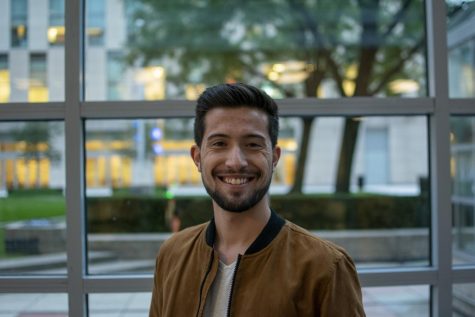Coronavirus Pushes Earth Day Celebrations Online
Protesters at the March for Science in Times Square on Earth Day in 2017. The young girl in the center was leading a chant that said “This is what democracy looks like.” Mass gatherings like this were unable to take place for this year’s event, but protesters found other ways to make their voices heard.
April 25, 2020
Earth Day is usually a scene of hundreds of thousands of people protesting for improved utility and care for the environment. However, this year, due to the coronavirus pandemic and the subsequent ban on all large gatherings in New York, the public protest on April 22 was not feasible. Despite this obstacle, multiple institutions and parks, including the American Museum of Natural History and Van Cortlandt Park, provided virtual tours, interactive activities and educational resources.
The Fordham community also met the challenge and adapted its ideas for celebration and activism by moving protests to a digital platform.
The two most prominent advocates of environmentalism at the Lincoln Center campus have been the Environmental Club, as well as the Social Innovation Collaboratory (SIC). The latter is a network of students, faculty, administrators, alumni and community members banding together to promote social innovation with respect to social justice, social entrepreneurship and environmental sustainability.
It was deeply disheartening to not be able to come together as a community to celebrate and protest.[/pullquote] On Earth Day, the Environmental Club took over Fordham Student Involvement’s Instagram account to share virtual events open to students, eco-friendly activities to perform despite the pandemic and ideas for practicing sustainability at home, as well as to celebrate past club projects and discuss future plans. Students were also encouraged to share any photos, activities and thoughts about the environment by direct messaging the Environmental Club’s Instagram account.
Kylie Ford, Fordham College at Lincoln Center ’20 and the current outreach director for the club, lamented the cancellation of the public protest but reported continued communication and activism between the E-Board and the members of the club.
“It was deeply disheartening to not be able to come together as a community to celebrate and protest. Nonetheless, I participated in a virtual lobby day pushing for state-level climate action in New York in order to remain politically engaged virtually,” she said.
“The E-Board also shared a number of virtual opportunities with club members via email, in the hope that they would engage with this Earth Day’s activities in whatever way was meaningful for them,” Ford continued.
SIC’s climate impact initiative planned a week of events beginning on April 20, including conversations about the impact of menstrual products; a Zoom conversation with Roger Sorkin, an award-winning screenwriter who focuses on environmental topics, about using narrative strategy to guide environmental policy; and a Netflix screening of the “Dark Seas” episode from the “Night on Earth” documentary series.
Sadibou Sylla, the associate director of SIC, spoke with pride about innovative student accomplishments for sustainability during this pandemic. He mentioned that students are currently working on projects involving sustainable fashion and creating “fashion masks” to use instead of single-use protective masks.

Columbus Circle, photographed on March 22, has been devoid of the usual crowds since social distancing measures were implemented. The usual Earth Day protests were also absent from Columbus Circle this year.
“We are striving to become an incubator for collaborative, innovative and sustainable solutions to social situations,” Sylla said. “When the coronavirus hit, rather than just being in receptive mode, we decided we needed to take action and become much more active. We actually formed a task force team as a result of the pandemic.”
Before Fordham closed for the semester due to the coronavirus, SIC was working on a campus sustainability index to observe and analyze how Fordham deals with waste and food management. Although data collection was interrupted, Sylla hopes to continue developing this project to use as a benchmark for other universities.
Sylla encourages students to join the SIC if they are interested in creating change and leaving a legacy behind at Fordham. The network continues to meet and discuss potential and current projects over Zoom. Similarly, the Environmental Club plans to continue sending informative articles and hosting Zoom events to keep members engaged despite the loss of in-person contact.












